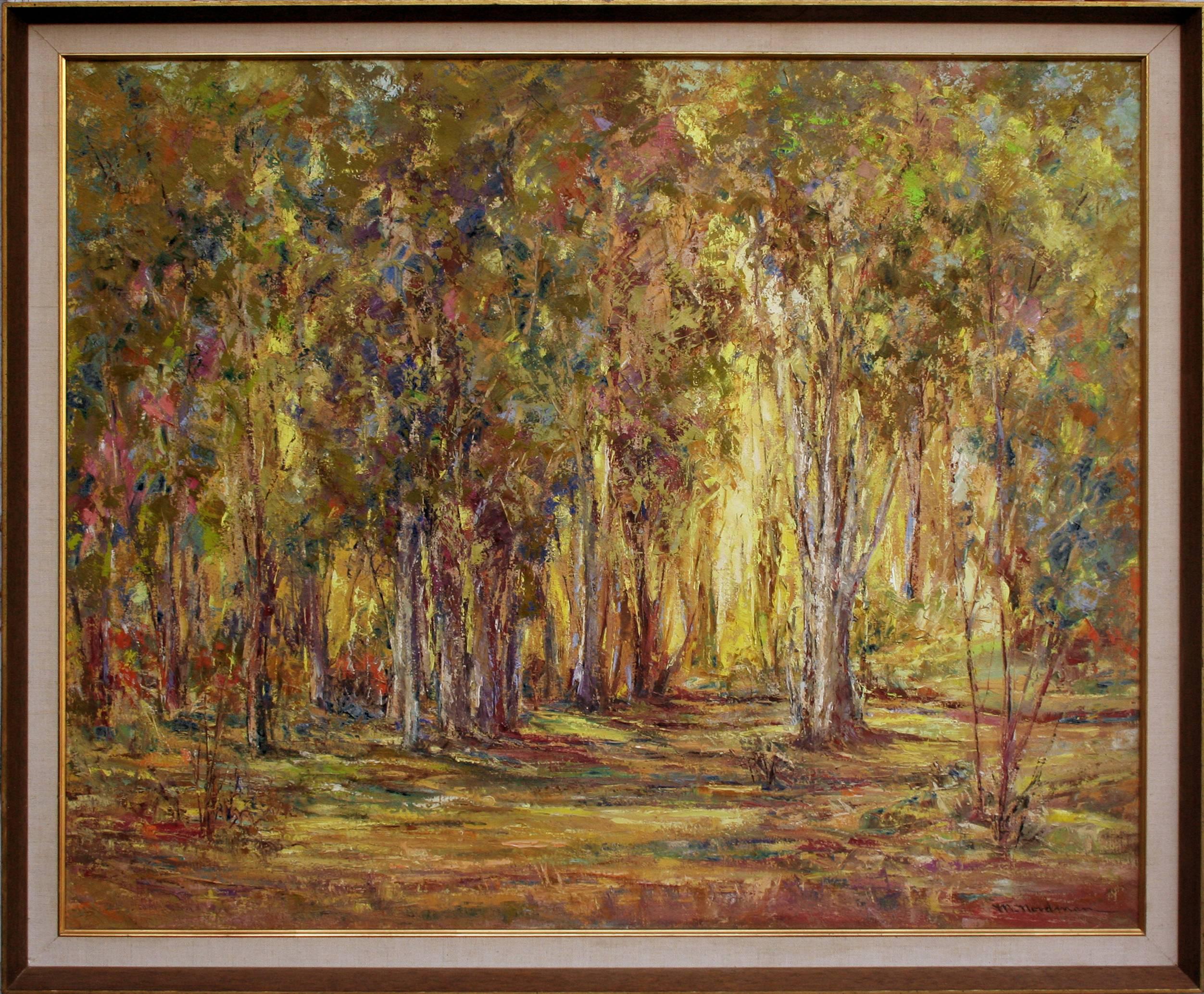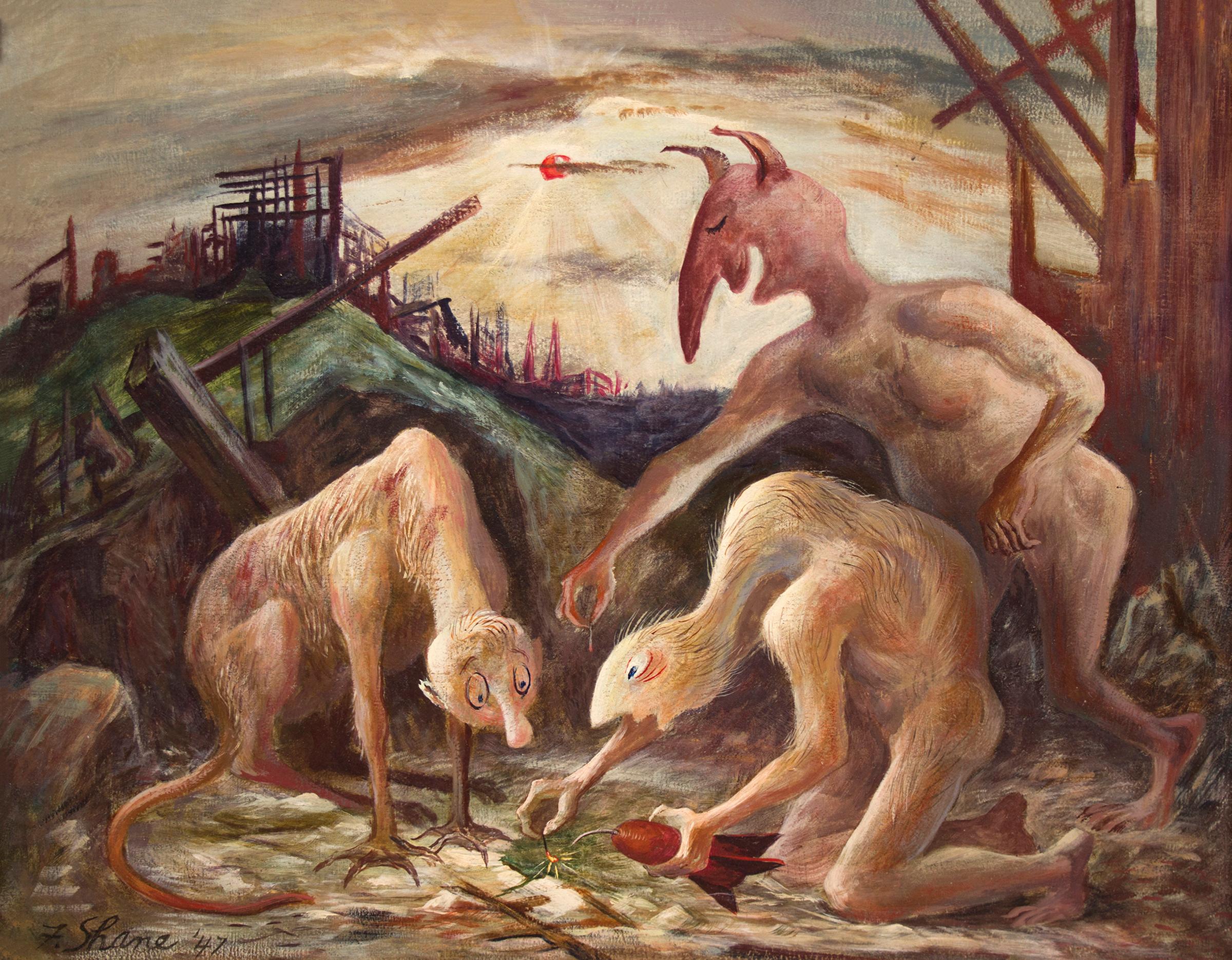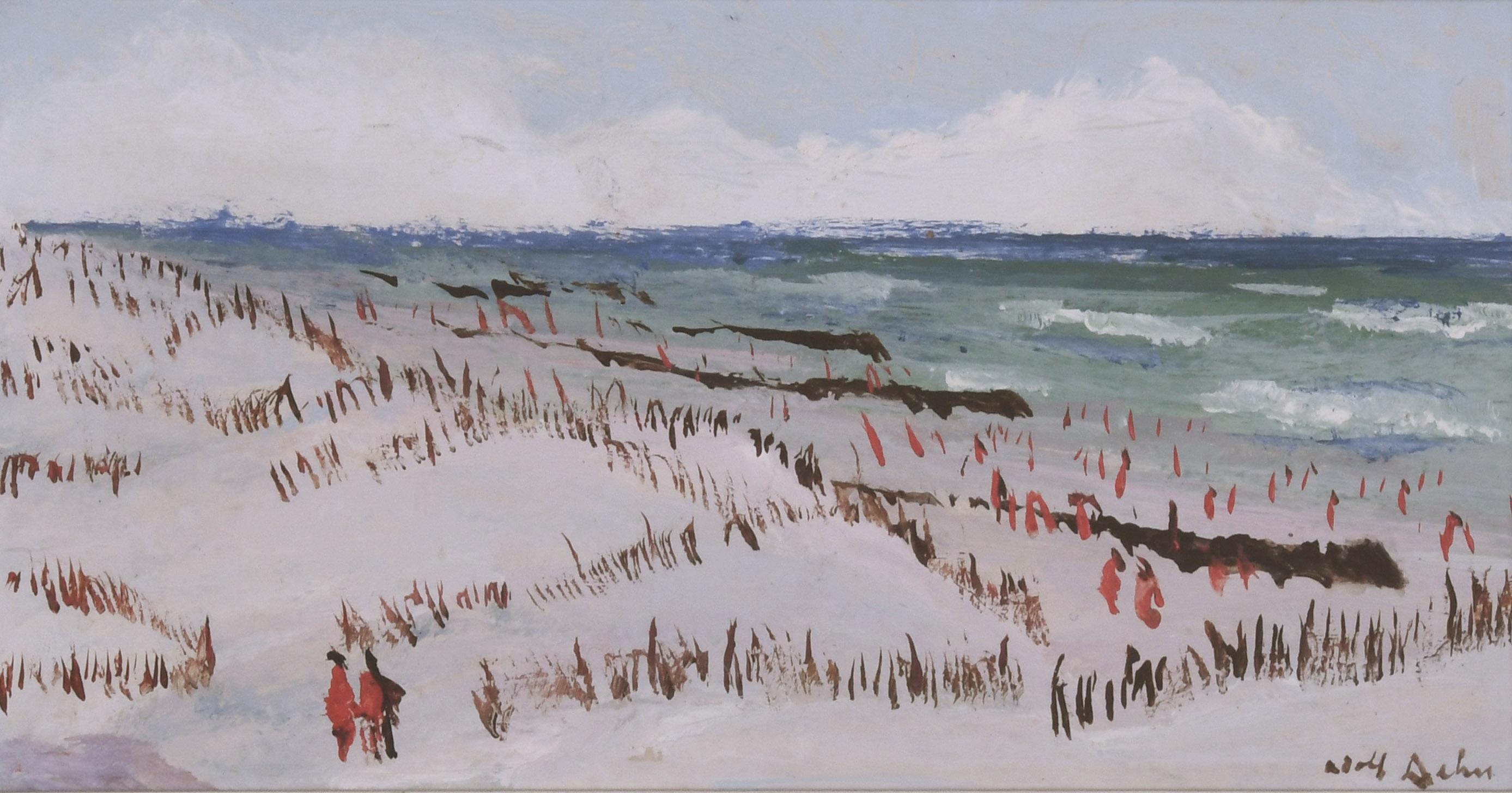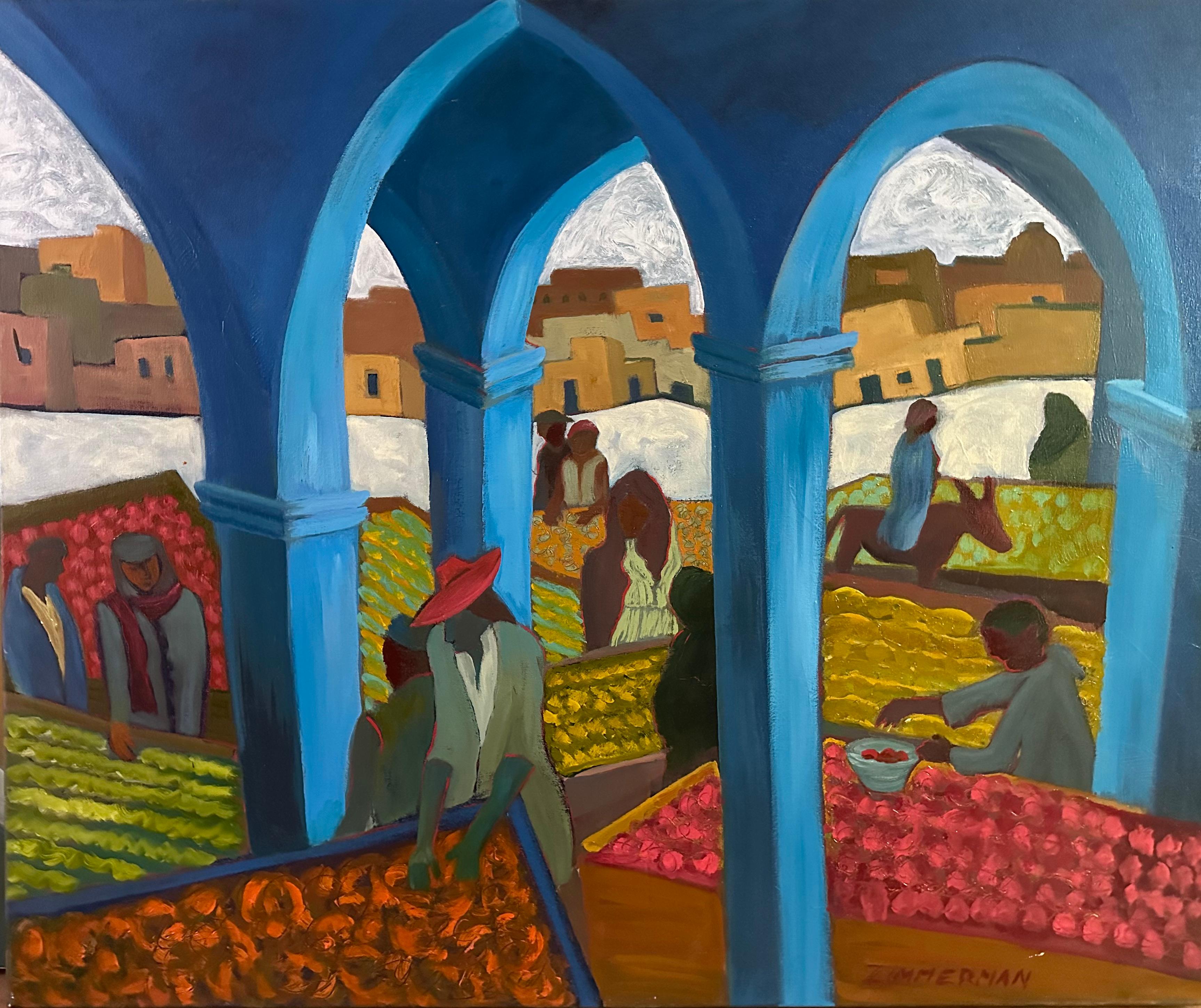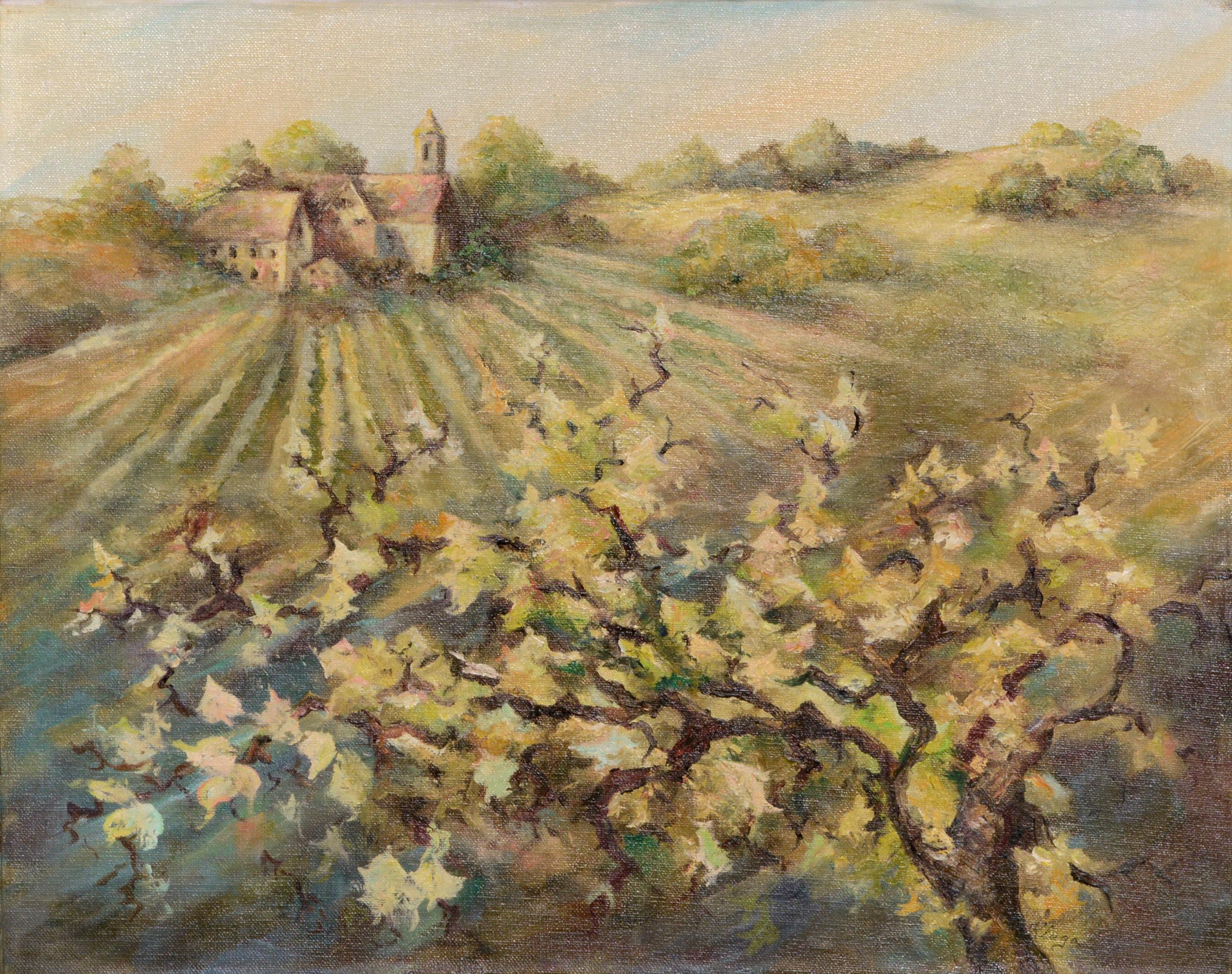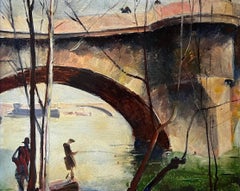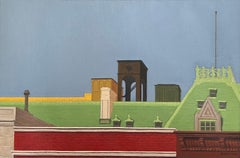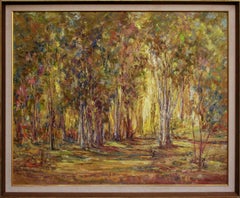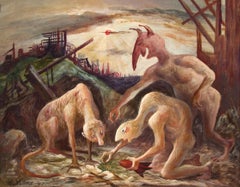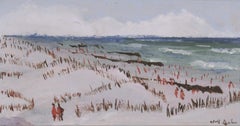Items Similar to Exterior Stairway
Want more images or videos?
Request additional images or videos from the seller
1 of 5
Edward BibermanExterior Stairwayc. 1970s
c. 1970s
About the Item
Exterior Stairway, c. 1970s, oil on masonite, signed upper right, 12 x 24 inches; illustrated (film) Kaufman, Jeffrey, Brush with Life: The Art of Being Edward Biberman, 2007, (DVD release 2010), 85 minutes
This work is part of our exhibition The Architectural World of Edward Biberman (1904 - 1986)
About the Painting
Exterior Stairway is a prime example of Biberman’s post-war precisionist scenes of Southern California, similar in feeling to The White Fire Escape, which has been in the collection of the Los Angeles County Museum of Art for more than fifty years. Biberman began working with a precisionist vocabulary in New York during the early 1930s upon his return from Paris. During his long career, Biberman consistently depicted architectural subjects as part of his practice. Critics have favorably compared these paintings to 1920s and 30s precisionism as practiced by Charles Sheeler, Louis Lozowick and Ralston Crawford, and noted that Biberman’s early Southern California modernist scenes anticipated those of Ed Ruscha and David Hockney. In a rare commentary on the work of other artists, Biberman himself acknowledged a debt to the great precisionist painter, Charles Demuth. In a 1975 interview, likely around the same time he painted Exterior Stairway, Biberman explained, “[T]here was a painter who deserves to be much better known, the American painter Charles Demuth. [He] painted a canvas that I saw when I was quite young. It was a painting of two great wheat silos, probably someplace in Kansas, and he titled that painting My Egypt. Now, I knew exactly what he meant by that. When I say I've always been fascinated by cities, engineering, [and] structural forms, I speak of something that has, emotionally, touched me very deeply. This interest has always been present in my work when I am not impelled, let us say, to paint things with an overtly social quality. You see, I think of myself as a very lyric painter. I love the look of nature, and I also love the look of many of the things that men build. I find both of these very wonderful, stirring, lyrical experiences.” In Exterior Stairway, we see the lyricism that Biberman found in both the structure of a conventional Southern California parking garage and Los Angeles’ iconic palm trees.
About the Artist
Edward Biberman was one of California’s most important modernist painters. He was born in Philadelphia, the son of Russian Jewish immigrants. Biberman’s artistic career started at the Pennsylvania Academy of Fine Arts followed by three years of study in Paris, where he associated closely with Calder and Noguchi and exhibited at the Salon d'Automne, Grand Palais, in 1927 and the Salon des Independents in 1929. Upon his return to the United States, Biberman spent time in New York City, where he showed at many of the city’s premier galleries and museums. His works were selected for several of the Museum of Modern Art’s early exhibitions of American artists, including 46 Painters and Sculptors Under the Age of 35 (1930) and Murals by American Painters and Photographers (1932). Hoping to escape the pressures of the New York art world, Biberman moved to Los Angeles in 1936 where he could be close to his family, including his film director brother, Herbert Biberman, and his sister-in-law, the Academy Award winning actress, Gale Sondergaard.
During the course of his long career, Biberman showed at the Salon d’Automne (Paris); the Whitney Museum of American Art; Metropolitan Museum of Art (New York), Corcoran Gallery, Los Angeles County Museum of Art (LACMA) and dozens of other museums and galleries across the US and in Europe. He enjoyed over forty-five solo exhibitions and his works were included in over one hundred group shows. Biberman completed three murals for public works projects, including his work Abbot Kinney and the Story of Venice for the Venice Post Office, which was installed for six months at LACMA in 2014. His works are in the permanent collections of more than a dozen museums, including the Museum of Fine Arts, Houston, National Portrait Gallery (of the Smithsonian Institution), Butler Institute of American Art, Pennsylvania Academy of Fine Arts and LACMA. Several books are dedicated to Biberman’s art, as is a feature length documentary, Brush with Life: The Art of Being Edward Biberman (2007). Biberman’s art has undergone a resurgence of popularity during the past fifteen years with four solo or focused exhibitions, Edward Biberman Revisited (2009), Edward Biberman (2011-12), Lost Horizons: Mural Dreams of Edward Biberman (2014) and Edward Biberman, Abbot Kinney and the Story of Venice (2014), and representation in a number of other exhibitions, such as George Ault and 1940s America at the Smithsonian Institution (2011), Pacific Standard Time (2012) and Contraption: Rediscovering California Jewish Artists (2018). He is listed in Who was Who in American Art and all other standard references. Biberman’s portrait of Martin Luther King, I Have a Dream, is currently on view at LACMA at part of Black American Portraits, a companion exhibition to the Obama presidential and first lady portraits.
Biberman’s brand of modernism can fairly be divided into four categories 1) precisionist urban scenes of New York and Southern California which celebrate the creations of humanity; 2) portraits which expose not only the historical context, but also the souls, of his subjects; 3) rural landscapes and still life paintings which portray the beauty of America and its flora; and 4) social realist works which explore the struggles, hopes and shortcomings of our society. Regardless of genre, Biberman had a unique sense of structure and color. His figures are at the same time specific and universal. Taken as a whole, Biberman’s body of work presents the viewer with a compelling and often daring vision of 20th century America and its art.
- Creator:Edward Biberman (1904 - 1986, American)
- Creation Year:c. 1970s
- Dimensions:Height: 24 in (60.96 cm)Width: 12 in (30.48 cm)Depth: 1 in (2.54 cm)
- Medium:
- Movement & Style:
- Period:
- Condition:
- Gallery Location:Los Angeles, CA
- Reference Number:1stDibs: LU1859210018112
About the Seller
5.0
Gold Seller
Premium sellers maintaining a 4.3+ rating and 24-hour response times
1stDibs seller since 2022
14 sales on 1stDibs
Typical response time: 19 hours
- ShippingRetrieving quote...Shipping from: Los Angeles, CA
- Return Policy
Authenticity Guarantee
In the unlikely event there’s an issue with an item’s authenticity, contact us within 1 year for a full refund. DetailsMoney-Back Guarantee
If your item is not as described, is damaged in transit, or does not arrive, contact us within 7 days for a full refund. Details24-Hour Cancellation
You have a 24-hour grace period in which to reconsider your purchase, with no questions asked.Vetted Professional Sellers
Our world-class sellers must adhere to strict standards for service and quality, maintaining the integrity of our listings.Price-Match Guarantee
If you find that a seller listed the same item for a lower price elsewhere, we’ll match it.Trusted Global Delivery
Our best-in-class carrier network provides specialized shipping options worldwide, including custom delivery.More From This Seller
View AllPonte Neuf (The Old Bridge)
Located in Los Angeles, CA
(Note: This work is part of our exhibition Connected by Creativity: WPA Era Works from the Collection of Leata and Edward Beatty Rowan)
Oil on panel, 14 ½ x 18 inches unframed, 22 x 25 ½ inches framed, inscribed “painted by David McCosh Property of Edward b. Rowan” and numbered “8” verso
Exhibited:
The First Exhibit of the Iowa Artist...
Category
1920s American Modern Landscape Paintings
Materials
Oil
The Railway Station
Located in Los Angeles, CA
The Railway Station, c. 1934, oil on canvas, signed lower right, titled verso and noted "34"; illustrated Kaufman, Jeffrey, Brush with Life: The Art of Being Edward Biberman...
Category
1930s American Modern Landscape Paintings
Materials
Oil
Price Upon Request
Highway Derelict
Located in Los Angeles, CA
Highway Derelict, May, 1939, oil on canvas board, signed upper right, 18 x 20 inches, exhibited 1) Society of Independent Artists, American Society of Fine Arts (Art Students League)...
Category
1930s American Modern Landscape Paintings
Materials
Canvas, Oil, Board
Untitled
Located in Los Angeles, CA
Untitled, c. 1940s, oil on Masonite, signed lower right, 19 ¾ x 25 ¾ inches
Ava Vorhaus Gabriel was a New York-based painter, lithographer, and designer. Born in Larchmont, Gabriel ...
Category
1940s American Modern Landscape Paintings
Materials
Masonite, Oil
Laundry Day (Untitled)
By Florence Walton Pomeroy
Located in Los Angeles, CA
Laundry Day (Untitled), c. 1940s, oil on canvas, signed lower left, 30 x 24 inches
Florence Walton Pomeroy was a New Jersey-based artist who primarily created portraits, still life...
Category
1940s American Modern Landscape Paintings
Materials
Canvas, Oil
Gracie Mansion
By Isabella Banks Markell
Located in Los Angeles, CA
Gracie Mansion, c. 1944, oil on canvas, signed lower right, 25 x 30 inches, presented in a newer frame
Isabella Markell was a painter, etcher, and sculptor, who is best known for ...
Category
1940s American Modern Landscape Paintings
Materials
Canvas, Oil
You May Also Like
Woodland Tapestry, 1970s Vintage Forest Landscape by Mildred Nordman
By Mildred Nordman
Located in Soquel, CA
Woodland Tapestry, 1970s Vintage Forest Landscape by Mildred Nordman
Beautiful vintage forest scene titled "Woodland Tapestry" by Mildred Nordman (Ame...
Category
1970s American Modern Landscape Paintings
Materials
Oil, Linen
Twilight of History, 1940s Original Figurative American Modernist Oil Painting
By Frederick Shane
Located in Denver, CO
"Twilight of History" is an original oil on board painting by Frederick Shane (1906-1992), created in 1947. This captivating piece depicts a powerful scene reflecting the "twilight" ...
Category
1940s American Modern Figurative Paintings
Materials
Oil, Board
Hawaiian Chickens - Animal Painting - American Modern By Marc Zimmerman
By Marc Zimmerman
Located in Carmel, CA
Three Roosters from the beautiful island of Kauai, being as goofy as the naturally can in this contemporary tropical jungle painting .
Hawaiian Chickens - Animal paintings by Marc Zimmerman
This masterwork is exhibited in the Zimmerman Gallery, Carmel CA.
Marc Zimmerman creates playful paintings, whether deep mysterious jungle or delightfully whimsical florals. His color palette explores various harmonies yet always surprises with new color excitement. Years of working with the woodcut print can be seen in Marc’s concise clarity of form and texture. His botanical world was initially inspired by the French artists; Henry Rousseau and Paul Gaugin. Painting journeys to the island of Kauai fueled Marc’s passion for the jungle series, lasting over 12 years. Having painted for 40 years, Marc now dedicates himself to the inventive and delicious world of color and form with his latest body of work; “Tropical Fantasy Floral “
Keywords: Green, Nature Painting, Animals Painting, Jungle Painting, Oil On Canvas...
Category
2010s American Modern Animal Paintings
Materials
Oil
Jersey Shore III
By Adolf Arthur Dehn
Located in Fairlawn, OH
Jersey Shore III
Casein on Masonite, 1967
Signed lower right (see photo)
Initialed, dated and titled verso
Provenance:
Estate of the artist
Virginia Dehn (the artist's widow)
Dehn Quests
Created on location on the Jersey Shore. The Jersey Shore was the main playground for thousand to escape the summer heat of New York. This small painting shows Dehn's mastery of patterning color to depict movement and recreation. Part of a suite of paintings done on this theme. Within a year of it's creation, Dehn dies from a heart attack.
Casein on Masonite
Condition: Excellent
Image: 6 x 11"
Frame: 9 3/8 x 14 1/2"
Adolf Dehn, American Watercolorist and Printmaker, 1895-1968
Adolf Dehn was an artist who achieved extraordinary artistic heights, but in a very particular artistic sphere—not so much in oil painting as in watercolor and lithography. Long recognized as a master by serious print collectors, he is gradually gaining recognition as a notable and influential figure in the overall history of American art.
In the 19th century, with the invention of the rotary press, which made possible enormous print runs, and the development of the popular, mass-market magazines, newspaper and magazine illustration developed into an artistic realm of its own, often surprisingly divorced from the world of museums and art exhibitions, and today remains surprisingly overlooked by most art historians. Dehn in many regards was an outgrowth of this world, although in an unusual way, since as a young man he produced most of his illustrative work not for popular magazines, such as The Saturday Evening Post, but rather for radical journals, such as The Masses or The Liberator, or artistic “little magazines” such as The Dial. This background established the foundation of his outlook, and led later to his unique and distinctive contribution to American graphic art.
If there’s a distinctive quality to his work, it was his skill in introducing unusual tonal and textural effects into his work, particularly in printmaking but also in watercolor. Jackson Pollock seems to have been one of many notable artists who were influenced by his techniques.
Early Years, 1895-1922
For an artist largely remembered for scenes of Vienna and Paris, Adolf Dehn’s background was a surprising one. Born in Waterville, Minnesota, on November 22, 1895, Dehn was the descendent of farmers who had emigrated from Germany and homesteaded in the region, initially in a one-room log cabin with a dirt floor. Adolf’s father, Arthur Clark Dehn, was a hunter and trapper who took pride that he had no boss but himself, and who had little use for art. Indeed, during Adolf’s boyhood the walls of his bedroom and the space under his bed were filled with the pelts of mink, muskrats and skunks that his father had killed, skinned and stretched on drying boards. It was Adolf’s mother, Emilie Haas Dehn, a faithful member of the German Lutheran Evangelical Church, who encouraged his interest in art, which became apparent early in childhood. Both parents were ardent socialists, and supporters of Eugene Debs...
Category
1960s American Modern Landscape Paintings
Materials
Oil
The Market #2 - by Marc Zimmerman
By Marc Zimmerman
Located in Carmel, CA
The universal farmers market is bustling with action. Geometric stalls with intense color coupled with contrasting blue arches creates the dynamism in this work of art.
The Market #...
Category
2010s American Modern Figurative Paintings
Materials
Canvas, Oil
Vineyard Estate Winery Landscape with Grape Vines in Oil on Canvas-Wrapped Board
By Jeane Kluga
Located in Soquel, CA
Vineyard Estate Winery Landscape with Grape Vines in Oil on Canvas-Wrapped Board
Beautiful landscape of a vineyard estate in California wine country with grape vines in the foregrou...
Category
1980s American Modern Landscape Paintings
Materials
Masonite, Cotton Canvas, Oil
Recently Viewed
View AllMore Ways To Browse
Modern Exterior
Edward Hoper
1940s Landscape Painting California
1920s California Landscape Paintings
Fire Escape Used
Modern Paintings Palm Trees
C Crawford
1930s Actress
David Hockney Los Angeles
David Hockney Tree
Portraits Of Men 1930
Noguchi 1
Vintage Parking Signs
Obama Hope
Escape From Egypt
Paintings With Silos
Kinney Oil
Precisionist Painting
